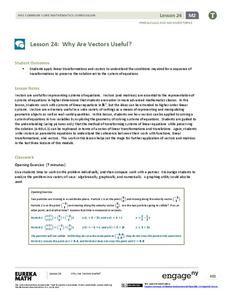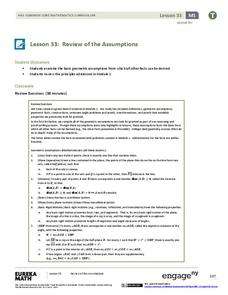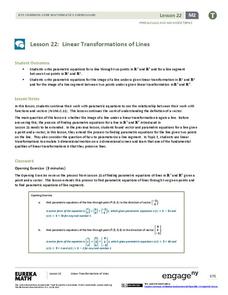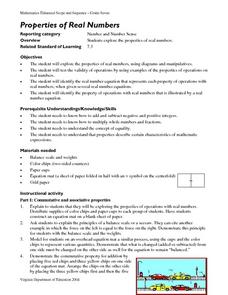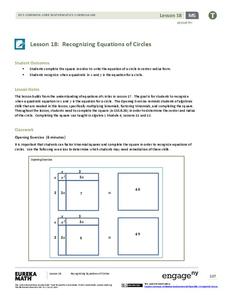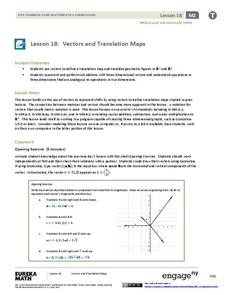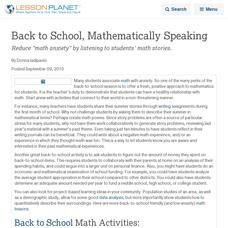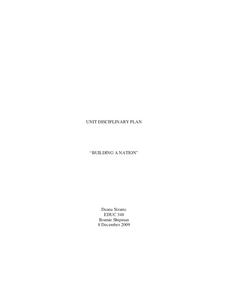Geometry Accelerated
Coordinate Geometry Additional Practice
Your learners get extra practice using coordinates in calculating mid points, finding end points, deciding if points are collinear, calculations using slope concepts, writing linear equations, using triangles and quadrilaterals, and...
EngageNY
Solving Exponential Equations
Use the resource to teach methods for solving exponential equations. Scholars solve exponential equations using logarithms in the twenty-fifth installment of a 35-part module. Equations of the form ab^(ct) = d and f(x) = g(x) are...
EngageNY
Matrix Multiplication and Addition
To commute or not to commute, that is the question. The 26th segment in a 32-segment lesson focuses on the effect of performing one transformation after another one. The pupils develop the procedure in order to multiply two 2 X 2...
EngageNY
Why Are Vectors Useful? 2
Investigate the application of vector transformations applied to linear systems. Individuals use vectors to transform a linear system translating the solution to the origin. They apply their understanding of vectors, matrices,...
EngageNY
Review of the Assumptions (part 1)
What was the property again? Tired of hearing this from your pupils? Use this table to organize properties studied and as a reference tool for individuals. Learners apply each property in the third column of the table to ensure their...
EngageNY
Choice of Unit
Explore using units with scientific notation to communicate numbers effectively. Individuals choose appropriate units to express numbers in a real-life situation. In this 13th lesson of 15, participants convert numbers in scientific...
EngageNY
Linear Transformations of Lines
Discover the extension of parametric equations to model linear transformations. Scholars first write parametric equations to model lines through two points. They then find the parametric equations that represent a linear transformation.
EngageNY
Matrix Multiplication Is Distributive and Associative
Learn the ins and outs of matrix multiplication. After discovering the commutative property does not apply to matrix multiplication in a previous lesson in the series, pupils now test the associative and distributive properties. The...
Curated OER
Piecewise Linear Functions: Extending Stories to Graphs
Using this resource, scholars develop graphs that model situations by showing change over time. They answer 15 questions based on information from charts that show growth in weight. They extend the concepts to an assessment section of...
Balanced Assessment
Bumpy-Ness
Develop a new measure of the properties of an object. Scholars develop a definition and formula to measure the bumpy-ness of an object. They utilize their formulas to find the property for several spherical objects.
Virginia Department of Education
Properties of Real Numbers
Students use paper cups and colored chips to observe properties of operations with real numbers. As a class, students brainstorm and use manipulatives to demonstrate associative, commutative, distributive identity and inverse properties....
Concord Consortium
Square-Ness
Are there some rectangles that are more square than others? A thought-provoking task asks individuals to create a formula that objectifies the square-ness of a set of rectangles. They then use their formulas to rank a set of...
Concord Consortium
Losing Track
Don't lose the chance to use the task. Given three diagrams of curved pieces of wires, young mathematicians must explain whether it's possible to conclusively match the wires as representing cubic, exponential, or quadratic functions....
EngageNY
Recognizing Equations of Circles
What does completing the square have to do with circles? Math pupils use completing the square and other algebraic techniques to rewrite equations of circles in center-radius form. They then analyze equations of the form x^2 + y^2 + Ax +...
EngageNY
Vectors and Translation Maps
Discover the connection between vectors and translations. Through the lesson, learners see the strong relationship between vectors, matrices, and translations. Their inquiries begin in the two-dimensional plane and then progress to the...
Balanced Assessment
Scale Charts
Develop scales using tables. Pupils complete charts to show equivalent scale factors before using the completed tables to determine the sizes of scale drawings. They finish the lesson and demonstrate their understanding by completing a...
Curated OER
Name That Number Game
In this mathematical expressions learning exercise, students figure out and write down 12 different mathematical expressions from the 5 cards shown on the table given on the learning exercise.
Curated OER
Back to School, Mathematically Speaking
Reduce "math anxiety" by listening to students' math stories.
Curated OER
Integers - Graphical Representation
In this integers worksheet, 8th graders solve 21 various types of problems to include writing statements given as integers, writing a positive or negative integer for each point on a number line, and arranging integers in order from...
Curated OER
Regents High School Examination
In this secondary mathematics worksheet, students are presented with questions indicative of those on the Regents high school examination. The twenty-four page worksheet contains a combination of thirty-four multiple choice and...
Curated OER
A is for Area, B is for Billion
Students use important math vocabulary by creating an illustrated storybook. They become familiar with the mathematics terms they encounter on a standardized test and connect these words to the world around them.
Curated OER
"Ex-SPAN-D" Your Math by Traveling Over the Chesapeake Bay
In this math lesson, students calculate the cost of bridge construction and time of completion. They solve and write short answers to 5 questions using mathematical operations.
Curated OER
Introducing Calculators:
Students work in small groups to record how many pets each has, then use calculators to find the total number of pets owned by students in the entire group. They practice basic addition skills on a worksheet and with a calculator.
Curated OER
Building A Nation
Students build their own nation in groups where they create a name, flag, declaration of independence, form of government, mathematical layout, and more. In this nation lesson plan, students also provide a scale drawing of their nation...





